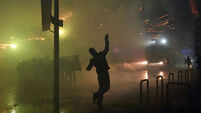Sharon under internal attack for Arafat siege
Israeli premier Ariel Sharon today escaped fierce domestic criticism for the bungled 10 day siege of Yasser Arafat’s compound, which was aborted under intense US pressure.
He had flown to Moscow for three days of talks by the time several of his cabinet ministers said Israel underestimated Washington’s opposition to the operation and its determination to keep the focus on Iraq ahead of a possible US strike against Saddam Hussein.














